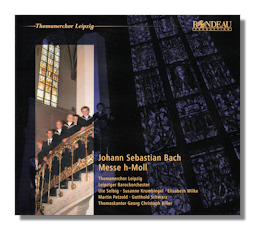
The Internet's Premier Classical Music Source
Related Links
- Bach Reviews
- Latest Reviews
- More Reviews
-
By Composer
-
Collections
DVD & Blu-ray
Books
Concert Reviews
Articles/Interviews
Software
Audio
Search Amazon
Recommended Links
Site News
 CD Review
CD Review
Johann Sebastian Bach

Mass in B minor, BWV 232
Susanne Krumbiegel, soprano
Ute Selbig, soprano
Elisabeth Wilke, alto
Martin Petzold, tenor
Gotthold Schwarz, bass
Leipzig Thomaner Choir
Leipziger Barockorchester/Georg Christoph Biller
Rondeau Productions ROP4009/10 2CDs 1:47:28
Recordings of the B minor Mass (Bach, BWV 232) abound, of course. There are, in fact, over 100 in the current catalog. In recent years and months we have had excellent and highly recommendable CD sets from Herreweghe and the Collegium Vocale Ghent (Phi 4), Butt and the Dunedin Consort and Players (Linn 354) and Konrad Junghänel with Cantus Cölln (Harmonia Mundi 501813). So there had better be a good reason for another.
While not the most spectacular or attention-demanding recording of this cornerstone of music (indeed high point in civilization; certainly summative work for Bach), this new two-CD set on Rondeau by musicians from St. Thomas church in Leipzig itself is well worth your consideration. It is technically very competent. The singing of the five professional soloists, Leipzig Thomaner Choir and dozen or so boy sopranos and the playing of the also dozen-strong Leipziger Barockorchester under Georg Christoph Biller are compelling, enjoyable and full of assertion, confidence and quiet persuasive momentum from first to last.
In compensation, perhaps, for the fact that this recording was not made in the Thomaskirche itself, but at the Großer Saal der Hochschule für Musik und Theater, "Felix Mendelssohn Bartoldy" in the same city, Biller has the distinction of being the 16th Thomas Cantor after Bach. His appointment to the post dates from 1992 – having sung in the Thomaner Choir himself. The Hochschule's acoustic is much less resonant than that of St. Thomas. For some listeners used to a rich sonic palette this may diminish the superficial impact of the music. For others who respond to the integrity and penetrating honesty of reduced forces, the Leipziger Barockorchester's period instrument performance will appeal all the more.
The interpretation has a dignity, an unassuming attachment to the solid and yet vivacious religious fervor of the B Minor Mass. Listen to the "Cum Sancto Spiritu" [CD.1 tr.11], for instance. Each section of the choir and orchestra is distinct; the contrapuntal lines are clean; the tempi neither too fast and showy; nor do they drag. The effect is of reverence and respect. The result is every bit as satisfying as that provided by larger forces more concerned with the mere sound of the music.
In fact a hallmark of this recording is the transparent articulation of the text and individual timbres of the instrumentalists – brass and woodwind in particular. At the same time, it's obvious that everyone involved in this recording thoroughly enjoyed, not the fact that they were recording the masterpiece and "bringing it" to the audience which they are. But the music itself.
Yet there are passages when the music doesn't quite lift off the ground. The pace of the "Et resurrexit" [CD.2 tr.6], for example, should be elevated, ecstatic and exuding energy. That isn't the case here. Rather, it's in the attestation in and of movements like the following "Et in Spiritum Sanctum" [CD.2. tr.7] where Biller's account is at its strongest – in the more introverted, affirmative and personal avowals of faith. We're used to splendor, flames, excitement (elsewhere). Although these qualities are not entirely absent from this recording, they're neither its essence nor hallmark.
Biller's conception of the "B Minor Mass" is as an act of worship as much as entertainment. The former aspect, though, can of course be uplifting. Unsurprisingly, the conductor is fully aware of the genesis and dimensions of the work, its context in the Catholic tradition and as Missa Ordinaria. He's also conscious of the history of its performance in Leipzig and at St. Thomas (where we know that the Choir was in fact not the first to perform the complete "B Minor Mass"). And his greatest strength as interpreter is to have balanced the various aspects of the work reaching the eminently acceptable conclusion that Bach humbly intended it as the offering of a devout Christian using whichever talents he felt himself to possess.
Indeed, it's this unpretentious and open, yet effective and contained, accepting yet very giving sense of the music which makes it as successful as it is here. It would have been possible, easy even, to have allowed the direct link to Bach to substitute for real interpretative substance. In fact, that heritage was Biller's starting point. He then resisted the temptation to embellish, over project or for that matter to understate either the nuances or the potential for glow and glory as the Mass unfolds. At the same time, this is not a performance devoid of thrust, commitment and interest. It's neither routine nor mundane. As stated, the soloists have distinct contributions; while not overbearing, their styles are certain and make marked differences… perfunctoriness is as far away as can be.
The acoustic, then, is more than adequate for and appropriate to the conception of this "B Minor Mass". It's contained yet responsive. The excellent booklet contains much information about the work itself, a personal statement by Biller, photographs of excerpts of the score, soloists, recording session and a useful dissection of the movements of the Mass cross-referenced to the two CDs' 25 tracks, with text. This is not what one would call a "niche" recording. Though it's one which sets out to meet a particular group of needs and fulfill simple purposes. It does its job very well and – while unlikely to be most people's first choice – should definitely be considered.
Copyright © 2013, Mark Sealey





















